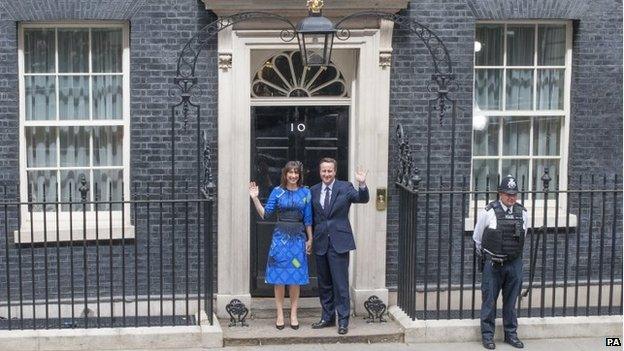David Cameron sets out academy 'vision' for every school
- Published
- comments
David Cameron: "I want the power to be in the hands of the headteacher and the teachers rather than the bureaucrats"
Every school in England should become an academy, PM David Cameron has said, as he set out his "vision for our schooling system".
Speaking to BBC News, he said academies improved standards and power should be in the hands of headteachers and teachers, "not bureaucrats".
It was announced in June that up to 1,000 schools in England, including failing ones, would become academies.
Academies are independent and funded directly by central government.
By June of this year, there were 4,676 of them open in England - the number has grown dramatically from 203 in May 2010.
More than half of all secondary schools in England are now academies.
However, academies have been opposed by teaching unions, who say they undermine the state school system and are a form of privatisation.
The National Union of Teachers (NUT, external), the largest teachers' union, also claims there is no evidence they raise standards.

What is an academy?
They are independent, state-funded schools that operate outside of local authority control.
They get money directly from the government, rather than from local councils.
Although the day-to-day running of academies remains the responsibility of head teachers or principals, they are overseen by individual charitable bodies called academy trusts and may be part of an academy chain.
They can have sponsors, such as businesses, universities, other schools, faith groups or voluntary groups.
Academies do not have to follow the national curriculum, and can set their own term times, but do still have to follow the same rules on admissions, special educational needs and exclusions as state schools. They are subject to inspection by Ofsted.


David Cameron is marking 100 days of the first majority Conservative government since 1997
Mr Cameron accused local authorities of not taking action on failing schools in the past and said his government would be "utterly intolerant of failure".
Regional schools commissioners and Ofsted would intervene "very, very quickly" when things went wrong at academies or free schools, Mr Cameron said.

Analysis: Sean Coughlan, BBC News education correspondent
David Cameron is marking the symbolic 100 days in office with a piece of political symbolism about England's schools.
There might be no new plans for more compulsion in turning more schools into academies.
But there is a clear political dig against Labour in taking on the mantle of public service reform.
Academies, introduced under Tony Blair, are now Mr Cameron's flagship education policy.
Innovation in schools policy is "something Labour used to understand", said the prime minister.
If he hasn't stolen their clothes, he has certainly put on their school uniform.
Mr Cameron wants a further acceleration of the academy policy.
But he also touched upon a practical challenge - saying he would make it a priority to find more academy sponsors and headteachers for academy chains.

The PM said the move to academies had seen "a million more children in good or outstanding schools".
"Those schools that are sponsored by academies, you can see the improvement in their results since they were taken over and given that extra independence and that extra assistance."
He said he wanted "the power to be in the hands of the headteacher and the teachers rather than the bureaucrats".
"My vision for our schooling system should be that every school should aspire to have that independence, for the head to be captain of the ship, to be able to make greater determination about the future of that school."
And in a Daily Telegraph, external article marking 100 days since the Conservatives' election victory, the PM said: "We will make it a priority to recruit more academy sponsors and support more great headteachers in coming together in academy chains."
- Published24 July 2015

- Published30 June 2015